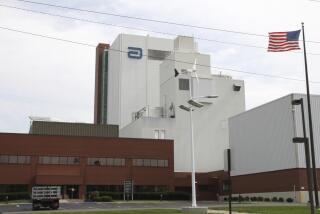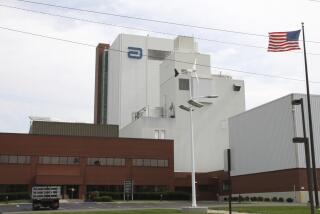Libyan Plant May Be Operating, U.S. Says
- Share via
WASHINGTON — The U.S. government strongly suspects that Libya has resumed production of poison gas at its Rabta chemical plant, which was thought to have been destroyed by fire earlier this month, an Administration official said Friday.
“Two weeks ago, it was off our priority list,” the official said. “Today it is back on our priority list--up high.”
The official, who declined to be identified, said Libyan leader Moammar Kadafi may have staged the fire March 14 to divert international attention from the plant, which U.S. intelligence agencies believe was designed to produce nerve gas and mustard gas. Libya insists the facility produces pharmaceuticals.
“We strongly suspect it is in production,” the official said.
The day after the fire, State Department spokeswoman Margaret Tutwiler, reading a statement prepared by Administration analysts, said intelligence indicated that the plant had been destroyed and could not be reopened without extensive repairs. At the time, the U.S. government urged all industrialized nations to refuse to help Libya get the plant back on line.
On Friday, however, Tutwiler’s deputy, Richard Boucher, said the Administration has reassessed the evidence and has determined that its earlier conclusion was far too optimistic.
“The U.S. government is reviewing all available evidence related to the March 14 events at Rabta,” Boucher said. “Important uncertainties remain regarding both the cause and the extent of damage at Rabta. Therefore, no definitive conclusions have been reached. The possibility remains that Libya can still produce chemical warfare agents.
“I’m aware of previous statements that I have made and others have made,” he added. “I think all I can do at this point is offer you our best analysis and our best estimate, and that is the possibility remains that Libya can still produce chemical warfare agents.”
Boucher said the Administration was aware of commercial satellite photographs showing the plant to be essentially undamaged. But he declined to say how large a role the photos played in Washington’s reassessment.
Commercial satellite photos are not nearly as detailed as the pictures taken by government spy satellites. Although Boucher refused to discuss U.S. satellite operations, there can be no doubt that the Administration either has ordered new satellite photos of the Rabta plant or will soon do so.
Defense Secretary Dick Cheney, asked about the Rabta plant after a speech to the Assn. of American Publishers, said it is too early to determine that the plant is no longer a threat.
“We certainly would not say that we do not consider it a threat,” Cheney said. “The plant’s still there. It still has, presumably, some residual capability.”
More to Read
Sign up for Essential California
The most important California stories and recommendations in your inbox every morning.
You may occasionally receive promotional content from the Los Angeles Times.













